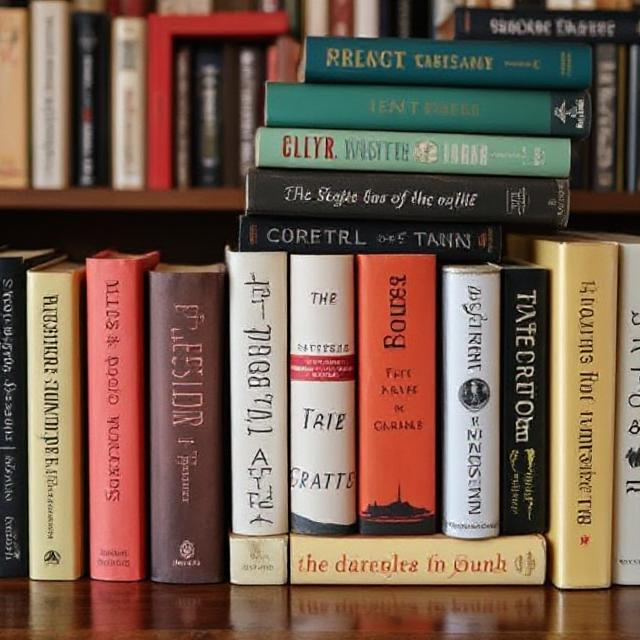
Summary
Fiction self help Fiction books can be powerful for self-growth, just like self-help books. They build empathy, change perspectives, teach resilience, and offer meaningful lessons through storytelling. Choosing books with deep themes, diverse viewpoints, and complex characters can inspire personal growth. Recommended reads like The Alchemist, To Kill a Mockingbird, and The Midnight Library teach valuable life lessons. To apply fiction to self-development, reflect on stories, journal insights, discuss with others, and take action. Fiction is more than entertainment—it helps you understand yourself and the world better.
Intruduction
When we think of self-development, non-fiction books like Atomic Habits or The 7 Habits of Highly Effective People often come to mind. These books are packed with actionable advice, frameworks, and strategies for personal growth. But what if I told you that fiction books can be just as transformative—if not more so—for your personal development journey?
Fiction has a unique power to inspire, challenge, and transform us. Through storytelling, it allows us to explore complex emotions, diverse perspectives, and universal truths about the human condition. Unlike self-help books that often prescribe specific actions, fiction invites us to reflect, empathize, and grow organically. It’s not just about escaping into a story; it’s about discovering parts of yourself within the narrative.
In this article, we’ll explore why fiction is a powerful tool for self-development, how to choose the right books, and a curated list of the best fiction books that can help you grow personally and professionally.
Why Fiction Books Are Powerful for Self-Development
- Emotional Intelligence and Empathy
Fiction immerses you in the lives of characters who are often very different from you. By walking in their shoes, you develop empathy and emotional intelligence. For example, reading about a character’s struggles with loss, identity, or ambition can help you better understand your own emotions and those of others. - Perspective-Shifting
Great fiction challenges your worldview. It introduces you to cultures, philosophies, and experiences you might never encounter in real life. This broadens your perspective and helps you think critically about your own beliefs and values. - Resilience and Problem-Solving
Fictional characters often face insurmountable odds. Watching them navigate challenges, make tough decisions, and grow through adversity can inspire you to tackle your own problems with courage and creativity. - Escapism with Purpose
While non-fiction can feel like homework, fiction offers a form of escapism that still enriches your mind. It’s a way to relax while simultaneously engaging with profound ideas and themes. - Storytelling as a Mirror
Fiction reflects the human experience. It holds up a mirror to your own life, helping you see your strengths, weaknesses, and potential for growth in a new light.
How to Choose the Right Fiction Books for Self-Development
Not all fiction is created equal when it comes to personal growth. Here’s how to pick books that will inspire and transform you:
- Look for Universal Themes: Seek out stories that explore themes like resilience, identity, love, loss, and self-discovery. These themes resonate deeply and encourage introspection.
- Diverse Authors and Perspectives: Reading books by authors from different cultures, backgrounds, and experiences can expand your worldview and challenge your assumptions.
- Complex Characters: Stories with well-developed characters who undergo significant growth are ideal for self-development. You’ll learn from their journeys and apply those lessons to your own life.
- Books That Challenge You: Choose books that push you out of your comfort zone, whether through their themes, writing style, or subject matter.
The Best Fiction Books for Self-Development
Here’s a curated list of fiction books that are not only captivating but also deeply transformative. These books have been chosen for their ability to inspire, challenge, and foster personal growth.
1. The Alchemist by Paulo Coelho
Why It’s Transformative: This timeless classic follows Santiago, a shepherd boy, on his journey to discover his personal legend. It’s a profound exploration of purpose, perseverance, and the importance of listening to your heart.
Key Takeaway: Your dreams are worth pursuing, even if the path is uncertain.
2. Man’s Search for Meaning by Viktor E. Frankl (Fiction-Inspired)
Why It’s Transformative: While technically a memoir, this book reads like a novel and offers a gripping account of Frankl’s experiences in Nazi concentration camps. It’s a powerful reminder of the human capacity for resilience and finding meaning in suffering.
Key Takeaway: Even in the darkest times, we have the power to choose our attitude.
3. To Kill a Mockingbird by Harper Lee
Why It’s Transformative: Through the eyes of young Scout Finch, this novel explores themes of racial injustice, morality, and empathy. It challenges readers to confront their own biases and stand up for what’s right.
Key Takeaway: Empathy and courage are essential for creating a just world.
4. The Midnight Library by Matt Haig
Why It’s Transformative: This novel follows Nora Seed, who finds herself in a library filled with books that represent the lives she could have lived. It’s a poignant exploration of regret, choice, and the beauty of the present moment.
Key Takeaway: Every life has value, and it’s never too late to start over.
5. Siddhartha by Hermann Hesse
Why It’s Transformative: This spiritual novel follows Siddhartha’s journey to enlightenment. It’s a meditation on self-discovery, the search for meaning, and the interconnectedness of all things.
Key Takeaway: True wisdom comes from within and through lived experience.
6. The Kite Runner by Khaled Hosseini
Why It’s Transformative: Set against the backdrop of Afghanistan’s tumultuous history, this novel explores themes of friendship, betrayal, and redemption. It’s a deeply moving story about the power of forgiveness and the weight of guilt.
Key Takeaway: Redemption is possible, but it requires courage and honesty.
7. The Power of One by Bryce Courtenay
Why It’s Transformative: This coming-of-age story follows Peekay, a young boy in South Africa, as he overcomes adversity and discovers his inner strength. It’s a testament to the power of determination and self-belief.
Key Takeaway: Even one person can make a difference.
8. The Book Thief by Markus Zusak
Why It’s Transformative: Narrated by Death, this novel tells the story of Liesel, a young girl in Nazi Germany who finds solace in stealing books. It’s a haunting exploration of the power of words, love, and humanity in the face of evil.
Key Takeaway: Words have the power to heal, inspire, and transform.
9. The Little Prince by Antoine de Saint-Exupéry
Why It’s Transformative: This allegorical tale is a profound meditation on love, loss, and the essence of life. It’s a reminder to see the world through the eyes of a child and cherish what truly matters.
Key Takeaway: What is essential is invisible to the eye.
10. Circe by Madeline Miller
Why It’s Transformative: This reimagining of Greek mythology follows Circe, a witch who transforms from a powerless nymph into a formidable and independent woman. It’s a story of self-discovery, resilience, and empowerment.
Key Takeaway: Embrace your uniqueness and find strength in your own voice.
How to Apply Fiction to Your Self-Development Journey
- Reflect as You Read
After each chapter or key moment, pause and ask yourself: What can I learn from this character’s experience? How does this relate to my own life? - Journal Your Insights
Keep a notebook to jot down quotes, themes, and reflections that resonate with you. This will help you internalize the lessons and apply them to your life. - Discuss with Others
Join a book club or discuss the book with friends. Hearing others’ perspectives can deepen your understanding and spark new insights. - Take Inspired Action
Use the stories as inspiration to take action in your own life. For example, if a character’s courage inspires you, take a bold step toward your own goals.
conclusion
Fiction is more than just entertainment—it’s a gateway to self-discovery and personal growth. By immersing yourself in stories that challenge, inspire, and move you, you can gain valuable insights into your own life and the world around you. So, the next time you’re looking for a self-help development book, consider picking up a novel. You might just find that the best lessons come from the most unexpected places.It can be our site also.
Now, it’s your turn. Which fiction books have transformed your life? you can check out theses resources Share your recommendations in the comments below, and let’s continue the conversation!
